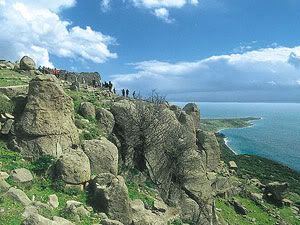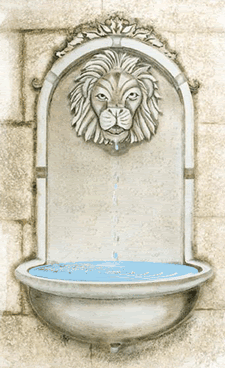The Frontier Between the Aethereal and the Perishable
Aristotle, being interested both in biology and in astronomy, found himself faced with an obvious contrast. The characteristic of the world we men inhabit is incessant change by birth, growth, procreation, death, and decay. And within that world such experimental methods as had been achieved in his time could discover only an imperfect uniformity. Things happen in the same way not perfectly nor invariably but 'on the whole' or 'for the most part'. But the world studied by astronomy seemed quite different. No Nova had yet been observed. So far as he could find out, the celestial bodies were permanent; they neither came into existence nor passed away. And the more you studied them, the more perfectly regular their movements seemed to be.

Along the Greek coastline, where Aristotle taught
Apparently, then, the universe was divided into two regions. The lower region of change and irregularity he called Nature. The upper he called Sky. Thus he can speak of 'Nature and Sky' as two things. But that very changeable phenomenon, the weather, made it clear that the realm of inconstant Nature extended some way above the surface of the Earth. 'Sky' must begin higher up. It seemed reasonable to suppose that regions which differed in every observable respect were also made of different stuff. Nature was made of the four elements, earth, water, fire, and air. Air, then (and with air Nature; and with Nature inconstancy) must end before Sky began. Above the air, in true Sky, was a different substance, which he called aether. Thus 'the aether encompasses the divine bodies, but immediately below the aethereal and divine nature comes that which is passible, mutable, perishable, and subject to death'. By the word divine Aristotle introduces a religious element; and the placing of the important frontier (between Sky and Nature, Aether and Air) at the Moon's orbit is a minor detail. But the concept of such a frontier seems to arise far more in response to a scientific than to a religious need.
~C.S. Lewis, The Discarded Image, Chapter 1: The Medieval Situation (1964)
__________________________
On this day:
1916 Lewis (age eighteen) receives a scholarship to University College, Oxford.




1 Comment(s):
I thought you might enjoy this post, Anamire!
By the way, the picture you picked out looks like it could have come right out of the movie Alexander. There's a scene where Aristotle is tutoring a group of boys in a place that looks just like that. Nifty!Wow, that's amazing. I just love the internet. I found that picture on a website selling tours of ancient sites in Greece.
Post a Comment
<< Home